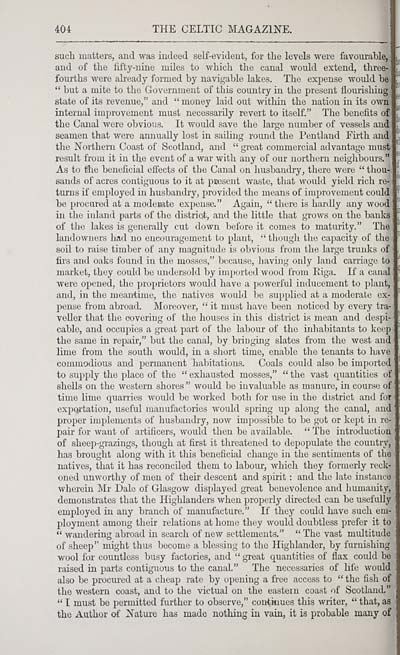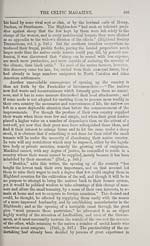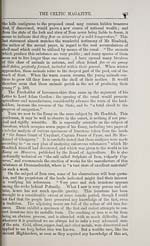Blair Collection > Celtic magazine > Volume 4
(414)
Download files
Complete book:
Individual page:
Thumbnail gallery: Grid view | List view

404 THE CELTIC MAGAZINE.
such matters, and was indeed self-evident, for the levels were favourable,
and of the fifty-nine miles to which the canal would extend, three-
fourths were already formed by navigable lakes. The expense would be
" but a mite to the Government of this country in the present flourishing
state of its revenue," and " money laid out within the nation in its own
internal improvement must necessarily revert to itself." The benefits of
the Canal were obvious. It would save the large number of vessels and
seamen that were annually lost in sading round the Pentland Firth and
the Northern Coast of Scotland, and " great commercial advantage must
result from it in the event of a war with any of our northern neiglibours."
As to the beneficial effects of the Canal on husbandry, there were " thou-
sands of acres contiguous to it at pisesent waste, that woidd yield rich re-
turns if employed in husbandry, provided the means of improvement could
be procured at a modeuato expense." Again, " tliere is hardly any wood
in the iuland parts of the district, and the little that grows on the banks
of the lakes is generally cut down before it comes to maturity." The
landowners had no encouragement to plant, " though the capacity of the
soil to raise timber of any magnitude is obvious from the large trunks of
firs and oaks found in the mosses," because, having only land carriage to
market, they could be undersold by imported wood from Riga. If a canal
were opened, the proprietors would have a powerful inducement to plant
and, in the meantime, the natives would be supplied at a moderate ex-
pense from abroad. Moreover, " it must have been noticed by every tra-
veller that the covering of the houses in this district is mean and despi-
cable, and occupies a great part of the laboiu' of the inhabitants to keep
the same in repair," but the canal, by bringing slates from the west and
lime from the south woidd, in a short time, enable the tenants to have
commodious and permanent habitations. Coals could also bo imported
to supply the place of the " exhausted mosses," " the vast quantities of
shells on the western shores " would bo invaluable as manure, in course of
time lime quarries would be worked both for use in the district and for
expQftation, useful manufactories would spring up along the canal, and
proper implements of husbandry, now impossible to be got or kept in re-
pair for want of artificers, would then be available. " The introduction
of shee]3-grazings, though at first it threatened to depopidate the country,
has brought along with it this beneficial change in the sentiments of tlie
natives, that it has reconciled them to labour, which they formerly reck-
oned unworthy of men of their descent and spirit : and the late instance
wherein Mr Dale of Glasgow displayed great benevolence and humanity,
demonstrates that the Highlanders when properly directed can be usefully
employed in any branch of manufacture." If they could have such em-
ployment among their relations at home they would doubtless prefer it to
" wandering abroad in search of new settlements." " The vast multitude
of sheep" might thus become a blessing to the Highlander, by furnishing
wool for countless busy factories, and " great quantities of flax could bo
raised in parts contiguous to the canal." The necessaries of life woidd
also be procured at a cheap rate by opening a fi^ee access to " the fish of
the western coast, and to the victual on the eastern coast of Scotland."
" I must be permitted further to observe," continues this writer, " that, as
the Author of Nature has made nothing in vain, it is probable many of
such matters, and was indeed self-evident, for the levels were favourable,
and of the fifty-nine miles to which the canal would extend, three-
fourths were already formed by navigable lakes. The expense would be
" but a mite to the Government of this country in the present flourishing
state of its revenue," and " money laid out within the nation in its own
internal improvement must necessarily revert to itself." The benefits of
the Canal were obvious. It would save the large number of vessels and
seamen that were annually lost in sading round the Pentland Firth and
the Northern Coast of Scotland, and " great commercial advantage must
result from it in the event of a war with any of our northern neiglibours."
As to the beneficial effects of the Canal on husbandry, there were " thou-
sands of acres contiguous to it at pisesent waste, that woidd yield rich re-
turns if employed in husbandry, provided the means of improvement could
be procured at a modeuato expense." Again, " tliere is hardly any wood
in the iuland parts of the district, and the little that grows on the banks
of the lakes is generally cut down before it comes to maturity." The
landowners had no encouragement to plant, " though the capacity of the
soil to raise timber of any magnitude is obvious from the large trunks of
firs and oaks found in the mosses," because, having only land carriage to
market, they could be undersold by imported wood from Riga. If a canal
were opened, the proprietors would have a powerful inducement to plant
and, in the meantime, the natives would be supplied at a moderate ex-
pense from abroad. Moreover, " it must have been noticed by every tra-
veller that the covering of the houses in this district is mean and despi-
cable, and occupies a great part of the laboiu' of the inhabitants to keep
the same in repair," but the canal, by bringing slates from the west and
lime from the south woidd, in a short time, enable the tenants to have
commodious and permanent habitations. Coals could also bo imported
to supply the place of the " exhausted mosses," " the vast quantities of
shells on the western shores " would bo invaluable as manure, in course of
time lime quarries would be worked both for use in the district and for
expQftation, useful manufactories would spring up along the canal, and
proper implements of husbandry, now impossible to be got or kept in re-
pair for want of artificers, would then be available. " The introduction
of shee]3-grazings, though at first it threatened to depopidate the country,
has brought along with it this beneficial change in the sentiments of tlie
natives, that it has reconciled them to labour, which they formerly reck-
oned unworthy of men of their descent and spirit : and the late instance
wherein Mr Dale of Glasgow displayed great benevolence and humanity,
demonstrates that the Highlanders when properly directed can be usefully
employed in any branch of manufacture." If they could have such em-
ployment among their relations at home they would doubtless prefer it to
" wandering abroad in search of new settlements." " The vast multitude
of sheep" might thus become a blessing to the Highlander, by furnishing
wool for countless busy factories, and " great quantities of flax could bo
raised in parts contiguous to the canal." The necessaries of life woidd
also be procured at a cheap rate by opening a fi^ee access to " the fish of
the western coast, and to the victual on the eastern coast of Scotland."
" I must be permitted further to observe," continues this writer, " that, as
the Author of Nature has made nothing in vain, it is probable many of
Set display mode to: Large image | Transcription
Images and transcriptions on this page, including medium image downloads, may be used under the Creative Commons Attribution 4.0 International Licence unless otherwise stated. ![]()
| Early Gaelic Book Collections > Blair Collection > Celtic magazine > Volume 4 > (414) |
|---|
| Permanent URL | https://digital.nls.uk/76556969 |
|---|
| Description | Volume IV, 1879. |
|---|---|
| Shelfmark | Blair.5 |
| Attribution and copyright: |
|
| Description | A selection of books from a collection of more than 500 titles, mostly on religious and literary topics. Also includes some material dealing with other Celtic languages and societies. Collection created towards the end of the 19th century by Lady Evelyn Stewart Murray. |
|---|
| Description | Selected items from five 'Special and Named Printed Collections'. Includes books in Gaelic and other Celtic languages, works about the Gaels, their languages, literature, culture and history. |
|---|

